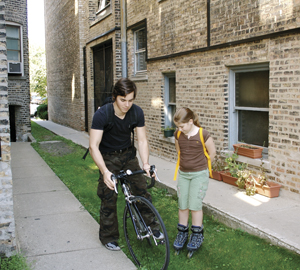
 |
||
About Articles Quotes Editor's Blog |
||
What Happens When Unschooled Kids Grow Up?
|
 Photo © Deborah Dyson |
Many books exist to revolutionize childbirth and childrearing. These books are invaluable tools for the early years of parenting. But what is there to meet or at least question the drop-off which occurs at that firmly implanted and culturally celebrated age of adulthood...18? Why do we, who work so hard to allow our young children to walk, talk, wean, and read on their own innate schedule suddenly decide to follow this arbitrary number? We need to create opportunities to further the development of and encourage the expression of the unique spirit within our adult children as well as within ourselves.
As in the early years of childrearing when the parent must care for her own inner-life, this co-creation can continue as our children become adults. At this time, much less of our parental effort is involved in physical caretaking, thus leaving space for creative undertakings. But in order to free our hearts and minds to even consider the possibilities at this time in our family’s life, we must once again remove ourselves from the societal mandate that we should raise our children to march along with the debilitating cycle that has not yet created a more individuated or self-sufficient society. The same child who was once asked why he was not in school is now the adult being asked why he is not in college or working, instead of apprenticing while living at home.
I am not attempting by any means to foster dominated, controlled, or antisocial groups of people. Nor is this a utopian fantasy of separation either. Instead, I am simply proposing that we look toward an expanded view of how we relate to children and adults with less emphasis on developmental agendas and more emphasis on co-creative potentiality. I’d like us to take our original views of education for the young and allow them to overflow into all ages. After all, a philosophy should remain consistent. If a six-year-old doesn’t have to read and a 15-year-old doesn’t have to study advanced mathematics, then a 22-year-old doesn’t have to embark on a career. There are innumerable possibilities for implementation of this idea, just as there are varied and self-directed individuals.
In the same way as we may have gained the courage to overcome the lack of support for early childrearing views, that strong and intuitive pull of the heart can lead us on the next step. As a single mother with six children 23 to 11 years of age, I try to live these concepts on a daily basis. My children and I work together in the creation of an environment that fosters growth and development for each member of the family.
With sons traveling to India and Europe to gather knowledge of food and language, another son at Northwestern University, a daughter who has parlayed her early nurturing experiences into a thriving babysitting business and a multitude of other experiences, our home is imbued with richness. At the same time, we are able to offer and learn care and compassion in crisis, as when my son recently was seriously ill. Never during that time did he have to worry about handling hospitals or tests alone because he was surrounded with family who struggled with him, learning individually and collectively more than we could ever expect. This year-long experience taught us that it is possible to work together while allowing for individuation and freedom for each member.
Part of the vision we gained during that time is the desire to delve deeper into our philosophy and buy land together. Basically, we want to expand upon our current arrangement to allow for a larger framework upon which to support the individual dreams of the group.
In a world of limited and stressed environmental resources, we must ask ourselves how we can continue to justify the burden of multiple households, consumer debt and the isolation that invariably follows. The cooperative investment of finances, talent, and strength should be an exciting testament to the capability of families to work outside the mainstream in a successful and consciously aware manner.
This may sound like a simple concept, yet like any idea that runs counter to mainstream thinking, it is often filled with obstacles. Our society begins fostering separation even before a child is born. Most of us are smug in our belief that a person is not independent until they are struggling on their own to survive.
 Photo © Deborah Dyson |
I believe it is time to take a serious look at what we really want in life for ourselves and for our children. Ashley Montague said, “If you regard each new idea as a possible new experience you will find your own life holding immense, indeed infinite, possibilities. For all you know to the contrary, within this widened range of experience you may come upon all that is lacking to complete your hopes of fulfillment and happiness.” For my family, this says it all. No matter where this idea carries us we will have widened our possibilities and continued to educate ourselves about all that lies within us.
Deborah Dyson is the mother of six children, Derek (23), Daniel (22), Joshua (19), Michael (17), Lauren (15) and Kristen (11) when this article was published in 2007. She lives and learns in Evanston, Illinois and any other place that she happens to visit. All six children have been unschooled from the start and that has been her life work and passion. From the beginning she was determined to learn with them and that is what the family has done. She believes that no one is always the student or always the teacher; learning is, instead, an organic process in which we all participate and thrive.